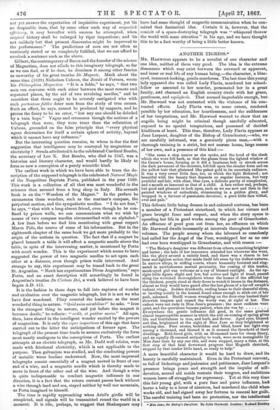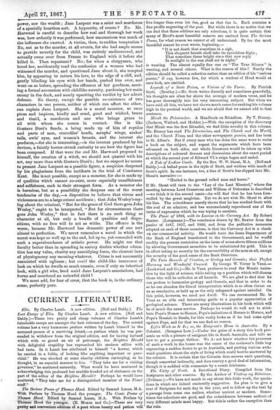ANOTHER TIGRESS.*
Mn. Hanwooc appears to be a novelist of one character an one idea, neither of them very good. The idea is the extreme dissonance which may exist between the outward or apparent, and inner or real life of any human being,—the character, a blue- eyed, innocent-looking, gentle murderess. The last time this young lady appeared she was called Lady Flavia, murdered her school- fellow or assented to her murder, personated her in a great family, and charmed an English country circle with her grace, gentleness, and espieglerie. That seemed improbable enough, but 1■Ir. Harwood was not contented with the violence of his con- trasted effects. Lady Flavia was, to some extent, rendered possible by her education, her heartlessness, and the suddenness of her temptations, and Mr. Harwood wanted to show that an angelic being might be criminal though carefully educated, exposed to no special temptations, and possessed of decided kindliness of heart. This time, therefore, Lady Davis appears as Jane Larpent, daughter of the Bishop of Granchester,—who, we are carefully informed, was a genuinely pious man,—with a. thorough training in a strict, but not morose house, large means of her own, and a presence of this kind :— " She came a step nearer as she spoke, and the hood of the cloak which she wore fell back, so that the gleam from the lighted window of the Canon's house, forming as it did a luminous belt or streak across. the dark pavement of the cloisters, fell full upon the slender form and on the yellow hair that glistened like palest gold in its uncertain radiance. It was a very sweet little face, too, on which the light flickered; not. beautiful with the beauty that depends on regular features, but very youthful and fair, with clear, blue eyes, a delicate purity of complexion, and a month as innocent as that of a child. A face rather sad, perhaps, but good and pleasant to look upon, such as we see now and then in the, painted windows of cathedrals, shimmering in a golden glory, and wrapped in a fervour of passionate devotion; a pure little face withal, oval and pale."
This delicate little being dresses in sad-coloured costume, has been a member of a Protestant sisterhood, to which her virtues and grace brought fame and respect, and when the story opens is. spendingher life in good works among the poor of Granchester. An effluence of good goes out from her, an effluence on which Mr. Harwood dwells incessantly at intervals throughout his three volumes. The people among whom she laboured so ceaselessly had called her the Angel of the Poor, worshipped her as no one- had ever been worshipped in Granchester, and with reason :—
"The Bishop's daughter was different from others, something brighter and better ; the halo of her innocence attended her wherever she went, like the glory around a saintly head, and there was a charm in her least and lightest action that made itself felt even by the dullest natures In narrow alleys in stifling courts, where humanity festered and stag- nated in unwholesome mutual proximity, the coming of this tender, meek-eyed girl was welcome as a ray of blessed sunlight. As the up- right little figure, slight and low, but active and light of tread, passed along the wretched thoroughfares where the homes of the afflicted lay the thickest, people stood at their doors to watch it lessen in the distance, almost as they would have gazed after the last gleam of a far-off seraph's radiant wings. Sodden drunkards, reeling home to their shameful sleep, or bawling noisily in the kennel, found sense enough to slink out of her path, ashamed. Shrill women wrangling on the door-step hushed their shrewish tongues and ceased the wordy war' at sight of her. The, rudest were not rude in Miss Jane's presence; the most reckless were
quiet, and the querulous became patient, when she was by Everywhere the gentle influence did good, in the same gradual almost imperceptible manner in which the soft on-coming of spring gives life and fruitfulness to tree, and herb, and flower. Aged eyes, bleared and dim, brightened at the sight of Miss Jane as they brightened at nothing else. Poor crones, bedridden and blind, knew her light step among a thousand, and blessed it as it crossed the threshold of their dwellings. Bold-faced girls, with an ill-omened taste for cheap finery, and an equally ill-omened antipathy to work, were more manageable by Miss Jane than by any one else, and were stopped, many a time, at the first step of that fatal downward progress that Hogarth sketched,. stopped by that tender little hand, so ready to help."
A more beautiful character it would be hard to draw, and its. beauty is carefully maintained. Even in the Protestant convent, so full of bickerings and jealousies and pettinesses, Jane Larpent's. presence brings peace and strength and the impulse of self- devotion, soured old maids restrain their tongues, and ambitions women leave off struggling for supremacy. Yet at this very time this fair young girl, with a pure face and purer influence, ha& borne a baby to a lover of nineteen, had murdered_ the child when weeks old, and had signed away her fortune to conceal her guilt The careful training had been no protection, nor the intellectual • Misr Jane, the Bishop's Daughter. By John Harwood. London: B..aluwd Bagley power, nor the wealth ; Jane Larpent was a saint and murderess of a specially heartless sort. A hypocrite, of course ? No. Mr. Harwood is careful to describe how real and thorough her work was, how ardently it was performed, how unconscious was much of the influence she exerted. A victim, then, to sudden temptation ? No, not as to the murder, at all events, for she had ample means to provide secretly for the child, was entirely undiscovered, and actually came over from France to England with it before she killed it. Then repentant P No; for when a clergyman, who loved her, accidentally read the confession of a woman who had witnessed the murder, and questioned Jane about it, she tempted him, by appearing to return his love, to the edge of a cliff, and, gently blinding his eyes with her hands, pushed him over, and went on as before, spreading the effluence of her goodness, meet- ing a formal accusation with childlike serenity, pardoning her main enemy in the dock, and nearly upsetting the verdict by her adroit defence. No theory, except the possible co-existence of two characters in one person, neither of which can affect the other, can explain Jane Larpent. She is a moral monster, at once pious aud impious, kindly and cruel, good and wicked, brave and timid, a murderess and one who brings grace to all with whom she comes in contact. She is like Gustave Dore's fiends, a being made up of bits of reptiles and parts of men, crocodiles' heads, seraphs' wings, snakes' tails, owls' eyes, and women's breasts, and the interest she produces,—for she is interesting,—is the interest produced by his devices, a faintly horror-struck curiosity to see how the figure has been composed. If that were the end Mr. Harwood proposed to himself, the creation of a witch, we should not quarrel with his art, any more than with Gustave Dore's ; but we suspect he means to present Jane Larpent as a possible figure, a suspicion deepened by his plagiarisms from the incidents in the trial of Constance Kent. She is not possible, except as a monster, for she is made up of qualities which cannot co-exist, more especially unselfishness and selfishness, each in their strongest form. As a monster she is harmless, but as a possibility she deepens one of the worst tendencies of the day,—a disposition to believe that virtue and viciousness are to a large extent accidents ; that John Wesley's say- ing about the criminal, "But for the grace of God there goes John Wesley," ought to be interpreted, "But for circumstances there goes John Wesley," that in fact there is no such thing as character at all, but only a bundle of qualities and dispo- sitions, with no free will to act as withe. The offence is the worse, because Mr. Harwood has dramatic power of one sort almost to perfection. We never remember a novel in which the secret was kept so well up to the end, led up to, yet concealed with such a superabundance of artistic power. He might use that faculty better than in spreading in society doubts whether educa- tion has any value, charity any sanctifying force, the clearest laws of physiognomy any meaning whatever. Crime is not necessarily associated with ugliness ; but could the child-like innocence of look on which he dwells so much remain, even if only an inherited look, with a girl who, bred amid Jane Larpent's associations, had borne and murdered an unlawful child ?.
We must add, for fear of error, that the book is, in the ordinary .sense, perfectly pure.































 Previous page
Previous page